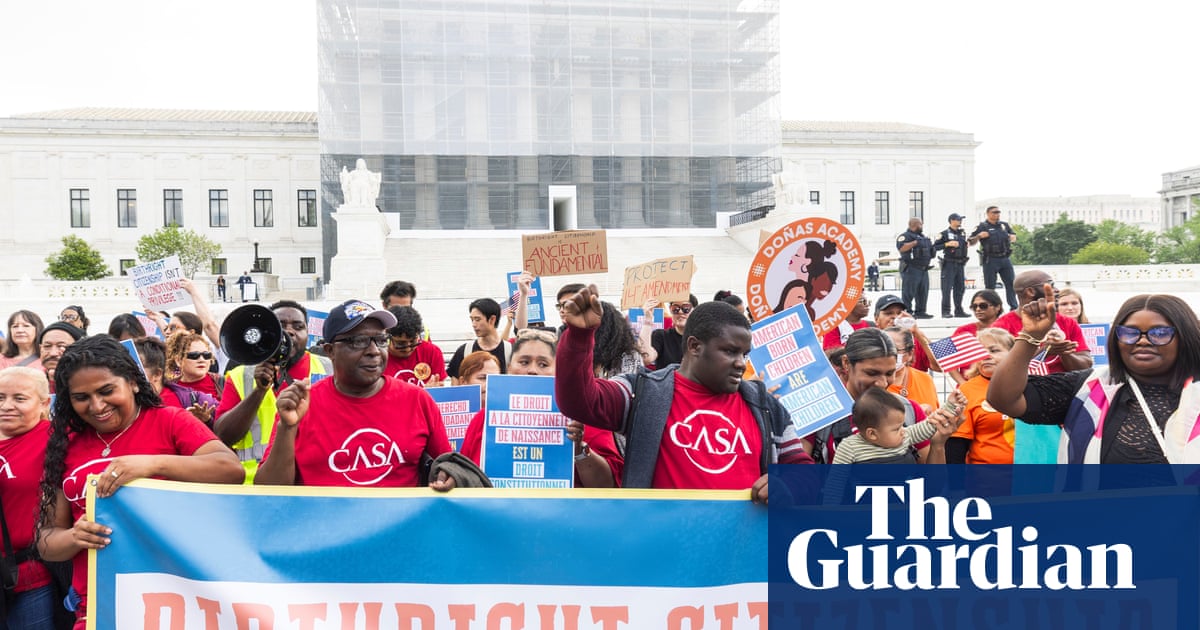US supreme courtjustices on Thursday took issue withDonald Trump’s attempt to sidestep the constitution to limit birthright citizenship, in a trio of immigration cases that could reshape presidential power and the role of federal courts.
The cases before the court stem from the president’s Januaryexecutive orderthat would deny US citizenship to babies born on American soil if their parents aren’t citizens or permanent residents. The plan is likely to be ultimately struck down, as it directly contradicts the 14th amendment, which grants citizenship to “all persons born or naturalized in the United States”.
But the court is mulling whether there is some weight to the justice department’s argument that “nationwide injunctions” often issued by federal judges unfairly tie the president’s hands. “These injunctions have reached epidemic proportions since the start of theTrump administration,” the department wrote in a March filing. The administration is asking for the scope of the injunctions to be narrowed, so they only apply to the people, organizations or states that sued.
The supreme court’s conservative majority, which includes three Trump appointees, has previously signaled skepticism about nationwide injunctions. Justice Neil Gorsuch called the issue a “question of great significance” requiring the court’s attention. But critics warn that limiting judges’ powers to block policies nationwide would force people to file thousands of individual lawsuits to protect their rights.
Read the full story
A photo of seashells posted on Instagram by the former FBI director James Comey is being investigated by theSecret Serviceafter the homeland security secretary, Kristi Noem, said it constituted a “threat” against Trump.
Comey posted a photo of seashells forming the message “8647”, with a caption that read: “Cool shell formation on my beach walk.” Trump’s supporters have interpreted the message as a coded endorsement of violence against Trump.
Read the full story
Trump announced deals totaling more than $200bn between the United States and the United Arab Emirates – including a $14.5bn commitment among Boeing, GE Aerospace and Etihad Airways – as he pledged to strengthen ties with the Gulf state during a multi-day trip to the Middle East.
Read the full story
One of the white Afrikaners brought into the US as refugees by theTrump administrationthis week has a history of antisemitic social media posts, despite the White House using alleged antisemitism as a rationale for deporting pro-Palestinian protesters.
Read the full story
Trump has admonished Apple and its chief executive, Tim Cook, over the tech firm’s reported plans to source production of US-bound iPhones from India.
Read the full story
AWisconsinjudge pleaded not guilty on Thursdayto chargesthat she helped a man who is in the country illegally evade US immigration authorities looking to arrest him in her courtroom.
Read the full story
TheUnited Arab Emiratesand the United States have signed an agreement for the Gulf country to build the largest artificial intelligence campus outside the United States, one of several deals around AI made during Donald Trump’s visit to the Middle East.
Read the full story
As HouseRepublicanspropose taking a sledgehammer to the green tax credits in Joe Biden’s Inflation Reduction Act, new data shows the loss of those incentives could lower some Americans’ household income by more than $1,000 a year due to increased utility bills and job losses.
Read the full story
A federal judge inNew Mexicodismissed trespassing charges against dozens of immigrants caught in a new military zone on theUS-Mexico border, in a blow to theTrump administration’sefforts to crack down on border crossings.
The Democratic mayor of Newark saidfederal prosecutors sought to “humiliate and degrade” him by taking hisfingerprints and mugshot for a second time.
The first Melania Trump statue in her native Sloveniawas destroyed by fire and now its bronze replacement has gone missing,prompting a police investigation.
Catching up?Here’s what happened on14 May 2025.
